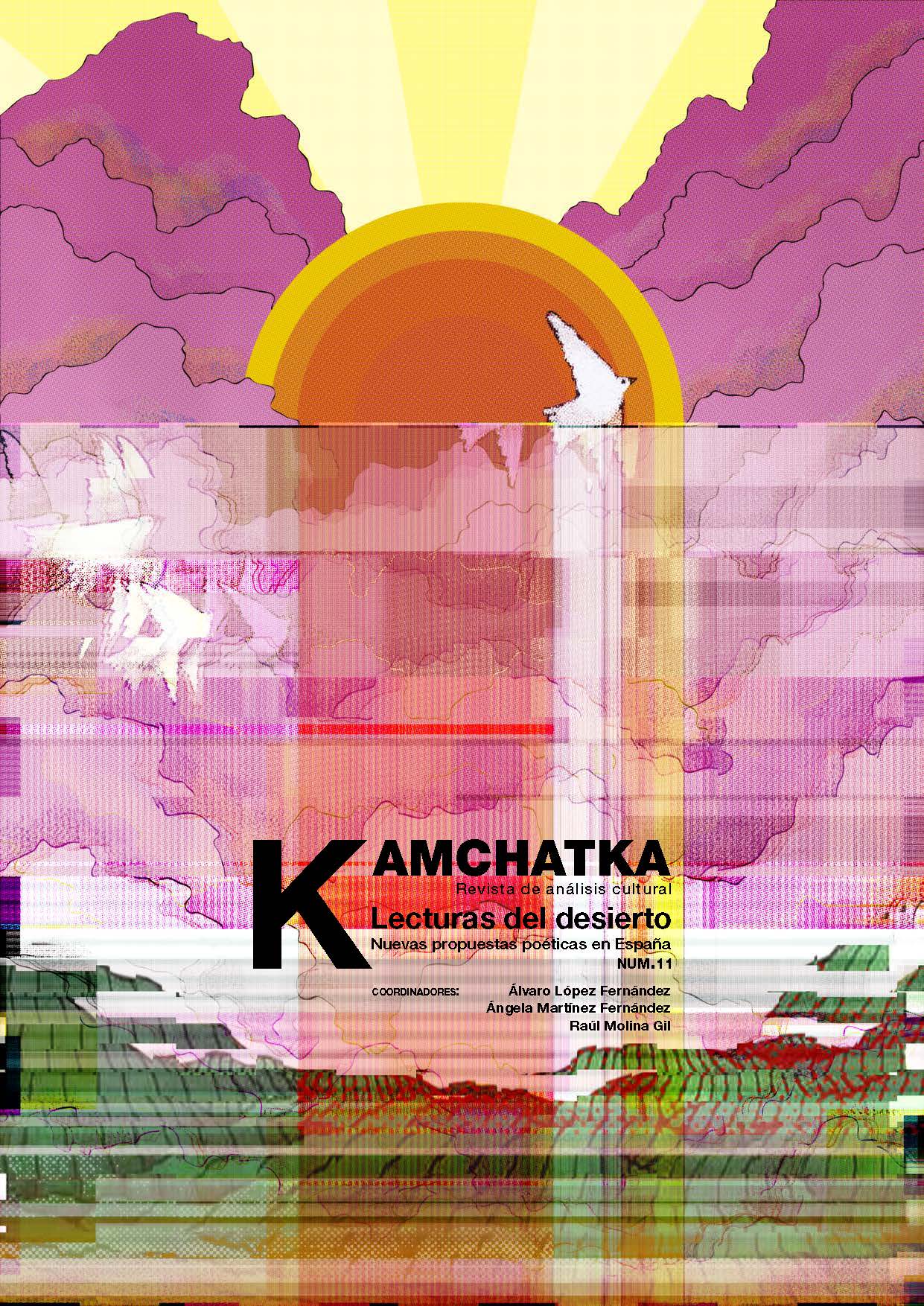For is not against; against is for. Poetry and communication today
DOI:
https://doi.org/10.7203/KAM.11.11496Keywords:
Spanish poetry, Communication, Language, María Salgado, Lucía Boscá, Su Xiaoxiao, Ruth Llana Abstract
Abstract
This article will tackle the implications that the communication model has had as a defining and exclusive feature of recent Spanish poetry. In these pages we will consider a genesis of the dichotomous categories’ construction to analyze the literary panorama in Spanish language, as well as the resultant problems associated with this form of analysis. In addition, the article intends to highlight the complexity of the poetic communication and to show some discursive practices that take advantage of their possibilities. Thus, if we understand communication as another characteristic to be found in the poem, we will present the different changes that are taking place in the writing of poetry as well as its criticism in the present work of four poets (Maria Salgado, Lucia Boscá, Su Xiaoxiao and Ruth Llana) and their poetics.
 Downloads
Downloads
 References
References
Benedetti, Mario (1972). Los poetas comunicantes. Montevideo: Biblioteca de Marcha.
Benéitez Andrés, Rosa. “Poesía como conocimiento frente a poesía como comunicación: una querella de largo recorrido”. Rilce. Revista de Filología Hispánica 34 (2018).
Boscá, Lucía (2014). Ruidos. San Sebastián de los Reyes: Universidad Popular de San Sebastián de los Reyes.
Boscá, Lucía (2017). “Poemas”. Uno y cero ediciones.
Bousoño, Carlos (1952). Teoría de la expresión poética. Hacia una explicación del fenómeno lírico a través de textos españoles. Madrid: Gredos.
Cambon, Glauco (2014). Eugenio Montale´s poetry: A dream in reason´s presence. Princeton: Princeton University Press.
Casado, Miguel (2006). Los artículos de la polémica y otros textos sobre poesía. Madrid: Biblioteca Nueva.
Gale, Lenore (1981). Poesía y comunicación en la lírica contemporánea hispanoamericana. London: University Microfilms internacional.
García Martín, José Luis (1988). La generación de los ochenta. Valencia: Consorci d´editores valencians.
García Montero, Luis (1996). “Una musa vestida con vaqueros”. Aguas territoriales. Valencia: Pre-Textos.
Jiménez Millán, Antonio (1994). “Antonio Jiménez Millán”. Luis Muñoz (ed.). El lugar de la poesía. Granada: Diputación provincial de Granada.
Lanz, Juan José (2007). La poesía durante la transición y la generación de la democracia. Madrid: Editorial Devenir.
Llana, Ruth (2014). tiembla. Sevilla: Point de Lunettes.
Llana, Ruth (2015). estructuras. Valencia: Ejemplar único.
Llana, Ruth (2017). umbral. Oviedo: Ediciones Malasangre.
López-Carballo, Pablo. “Confluencias hispánicas”. Bulletin of Hispanic Studies 94-10 (2017): 1117- 1132.
Méndez Rubio, Antonio. “Memoria de la desaparición: notas sobre poesía y poder”. Anales de literatura española 17 (2004): 121-144.
Milán, Eduardo. “Nicanor Parra. El riesgo de antescribir”. Estudios públicos nº136 (Primavera 2014).
Montale, Eugenio (1995). De la poesía. Valencia: Pre-Textos.
Mora, Vicente Luis (2006). Singularidades. Ética y poética de la literatura española actual. Madrid: Bartleby.
Morabito, Fabio (2006). “Introducción”. Montale, Eugenio. Poesía completa. Barcelona: Galaxia Gutemberg.
Morante, José Luis (2016). “Entrevista”. Uno y cero ediciones.
Salgado, María (2012). ready. Madrid: Arrebato libros.
Salgado, María (2016). Hacía un ruido. Frases para un film político. Valencia: Ediciones Contrabando.
Schopf, Federico (2000). Del Vanguardismo a la antipoesía. Ensayos sobre la poesía en chile. Santiago de Chile: Lom Ediciones.
Su Xiaoxiao (2015). La casa de la ciénaga, Madrid: Ártese quien pueda.
Villena, Luis Antonio de (1986). Postnovísimos. Madrid: Visor.
Villena, Luis Antonio de (2010). La inteligencia y el hacha. Madrid: Visor.
VV. AA. Alicia Bajo Cero (1996). Poesía y poder. Valencia: Ediciones Bajo Cero.
VV. AA. (2011) Poetas ante la incertidumbre. Madrid: Visor.
Downloads
Published
How to Cite
-
Abstract1178
-
Artículo (Español)626
Issue
Section
License
This journal provides an immediate free access to the content on the principle that freely make investigation available to the public, which promotes an increased global knowledge exchange.
Unless otherwise indicated, texts published in this journal are under the license Attribution-NonComercial 4.0 by Creative Commons. These texts may be copied, distributed and publicly communicated whenever the publication’s author and title are quoted and whenever they are not used for commercial purposes. In any case, intellectual property of the articles and its potential economic rights entirely belong to its authors.
The full license can be consulted on https://creativecommons.org/licenses/by-nc/4.0/. We encourage authors to disseminate papers published in Kamchatka. Journal of cultural analysis electronically, in institutional digital repository or in their websites.





